Please activate JavaScript in your browser to use all interface options.
Global Energy Balance: Heads of Major Energy Companies, Experts Discuss Future of Energy Sector at SPIEF
21 June 2025-350x1000.jpg)
At the Energy Panel of the XXVIII St. Petersburg International Economic Forum, leading industry experts, politicians, scientists, government officials and heads of major international energy companies discussed current trends in the global energy market.
Their assessments and forecasts largely coincided with the visionary concept of industry development presented by Igor Sechin, Head of Rosneft. In his report "Odyssey of the Global Economy in Search of the Golden Fleece. The New Landscape a of the Global Energy Industry", he announced that the current state of the global energy industry is at the stage of formation of a new image due to the multiple growth of electricity consumption, the generation of which will be provided by both fossil fuels and renewable energy sources. According to him, the optimal solution today is “synthesis of conventional and alternative energy sources”.
The event, organized with the support of Rosneft, was addressed by Mohammed Bin Saleh Al-Sada, Chairman of the Rosneft Board of Directors, Delcy Rodriguez, Executive Vice President of the Republic of Venezuela, Simon Aloysius Mantiri, Chief Executive Officer of Pertamina, Zhang Daowei, Vice President of CNPC, Shiva Prasad Panda Madhusudana, Executive Director of Reliance Industries, Alexander Dynkin, Academician of the Russian Academy of Sciences, Zhurabek Mirzamakhmudov, Minister of Energy of the Republic of Uzbekistan, Nobuo Tanaka, Chairman of the Supervisory Board of the Japanese government's non-profit Low Carbon Technology Initiative, and David Gadzhimirzaev, President of TOFS.
ENERGY TRANSITION WITHOUT TRANSITION
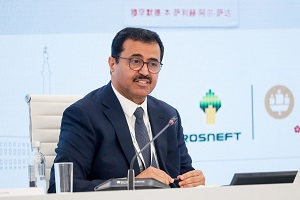 Mohammed Bin Saleh Al-Sada opened the discussion of Igor Sechin's report, noting the depth of his analysis. “It was comprehensive - the way you showed that progress and energy are inseparable,” Al-Sada addressed Sechin.
Mohammed Bin Saleh Al-Sada opened the discussion of Igor Sechin's report, noting the depth of his analysis. “It was comprehensive - the way you showed that progress and energy are inseparable,” Al-Sada addressed Sechin.
The head of Rosneft's Board of Directors drew the audience's attention to the fact that despite the active promotion of the idea of transition to RES, the share of fossil energy sources in the energy mix has not changed in recent decades. He recalled that Igor Sechin mentioned in the report that fossil fuels account for 80% of the global energy mix. "And this statistic has not changed for the last 20 years! We are fluttering around these 80% fossil fuels and energy sources, and so not much has changed!" exclaimed Al-Sada, describing the situation in the global energy sector.
“In other words, we are essentially not making any transition away from hydrocarbons,” he concluded, emphasizing that the transition to renewables is being imposed on the industry and the public.
"I would also like to take as a baton from Mr. Sechin, and pass my comment to you. It's like food for thought: are we actually transitioning from fossil fuels to renewable fuels?“,” Al-Sada addressed the audience.
The Rosneft Chairman also noted that energy demand does not always coincide with production growth for various reasons.
"I would like to express two small thoughts in order to further enhance the valuable things we heard in Mr. Sechin's words. <...> Lack of investment is already a reality in the hydrocarbon and energy sectors. This is something that could really bring us to a serious energy shortage. "If this trend continues we could face an energy shortage. This is not only my personal opinion, but also what a large number of analysts, including the International Energy Agency, and other respected experts, who in their reviews have emphasized the importance of having sufficient investment in the hydrocarbon sector. Otherwise, we will face the risk of a primary energy shortage!", emphasized Al-Sada.
FUTURE FOR SYNERGY
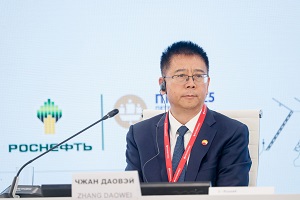 Zhang Daowei, Vice President of China's CNPC, remarked on the interest in the report by Rosneft's CEO. In his speech, the top manager of the Chinese company expressed similar assessments of the ways of development of the global energy sector - in particular, the need for synergy between traditional and new energy sources.
Zhang Daowei, Vice President of China's CNPC, remarked on the interest in the report by Rosneft's CEO. In his speech, the top manager of the Chinese company expressed similar assessments of the ways of development of the global energy sector - in particular, the need for synergy between traditional and new energy sources.
“We have always believed that in the context of the energy transition course, it is necessary to adhere to synergetic, integrated development of traditional and new energy sources, to take full account of the characteristics and degree of development of our countries' markets, to properly link energy transition with energy security, and to promote a fair and sustainable model of energy transformation,” Daowei said.
According to the vice president, under this philosophy, CNPC, on the one hand, continues to increase the exploration and development of oil and gas fields domestically and import high-quality resources from abroad, including strengthening long-term cooperation with Russia in the field of hydrocarbon trade. On the other hand, CNPC is actively pursuing a green, low-carbon development strategy and realizing the development of a “three-step strategy” combining oil and gas projects with wind, solar, geothermal, hydrogen and carbon capture technologies.
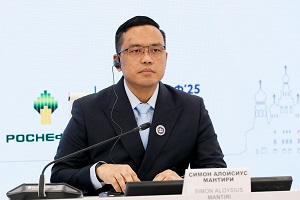 Simon Aloysius Mantiri, President and CEO of Pertamina Indonesia, said that the company is pursuing a dual growth strategy that is based on both conventional resources and low-carbon solutions. Meanwhile, natural gas plays an important role in the country's energy mix.
Simon Aloysius Mantiri, President and CEO of Pertamina Indonesia, said that the company is pursuing a dual growth strategy that is based on both conventional resources and low-carbon solutions. Meanwhile, natural gas plays an important role in the country's energy mix.
"Natural gas is at the center of our strategy to transition to cleaner fuels. And today we are expanding our LNG capacity and capability for both domestic and export needs," he said.
The Pertamina chief virtually reiterated the point made in Igor Sechin's report and emphasized that by achieving a balance of energy sources and a comprehensive approach, the company is able to ensure high economic growth and carbon neutrality in parallel.
Reliance Industries CEO P.M.S. Prasad said India does not choose between energy access and innovation. "It is integrating both. By developing scalable, context-specific solutions, it is addressing local priorities while making a significant contribution to global sustainability. From rural microgrids to energy efficient data centers, India is turning its potential into a strategic asset," Prasad said.
He emphasized that international partnerships play a vital role in this ambitious effort. "Energy remains a key cornerstone of the strategic relationship between India and Russia. India values this trusted partnership and appreciates the cooperation forged over decades. The leadership of both countries is committed to take this partnership to an even higher bar in the future," summarized Reliance Industries' CEO.
NUCLEAR POWER PLANTS ARE NOT BEING WRITTEN OFF
Rosneft CEO Igor Sechin, in his keynote speech at the Energy Panel, noted the growing interest in nuclear power generation worldwide and, accordingly, the growth of investments in this area. According to him, this is happening against the backdrop of growing energy consumption and in future nuclear power will be in demand along with fossil sources and renewable energy sources.
Reliance Industries CEO Panda Madhusudana Shiva Prasad, in turn, speaking on India's energy outlook, emphasized the significant role of nuclear power generation.
"Gas, renewables supported by energy storage systems and a robust transmission grid, and nuclear power will play a key role. India's bold nuclear program, including small modular reactors, reflects its commitment to long-term energy security and decarbonization," Prasad said.
The renewed interest in investments in NPP construction was noted in the speech of Uzbek Minister of Energy Zhurabek Mirzamakhmudov. He spoke about joint plans with Russia to build two units of 55 megawatts each, and two units of VWR type reactors - water-water power reactor. The head of the ministry also said that gas-fired power plants are being installed in the country, hydropower is being developed, the share of renewable sources is increasing, and storage systems are being created at the same time.
The Minister noted the substantial nature of Igor Sechin's report, which contains a detailed analysis and reflects all trends in the development of global energy, science and economy.
ENERGY SECURITY IN FIRST PLACE
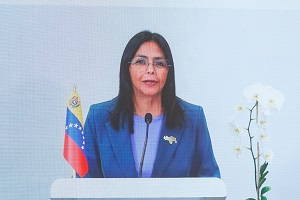 Delcy Rodriguez, Executive Vice President of the Republic of Venezuela, in her speech supported the thesis expressed by the head of Rosneft that energy security issues should come first.
Delcy Rodriguez, Executive Vice President of the Republic of Venezuela, in her speech supported the thesis expressed by the head of Rosneft that energy security issues should come first.
“We always advocate that the energy transition be carried out responsibly, taking into account reality, to avoid abrupt changes that could jeopardize energy security,” Rodriguez said.
Venezuela's Executive Vice President named the main components of a stable energy system of the future: energy security, reliable supply, accessibility for all, while respecting nature - with minimal environmental impact.
Among the main threats to energy security, Rodriguez named illegal sanctions against producing countries and the hegemony of the dollar.
Nobuo Tanaka, Chairman of the Supervisory Board of the Japanese government's non-profit Low Carbon Technology Initiative, said the answer to energy security is always to diversify supply sources, improve energy efficiency and seek alternative energy sources, including renewable energy, nuclear energy and regulate the market with predictable policies.
AGAINST LOGIC
The panelists drew attention to the political events of recent decades and stated that geopolitics is now shaping the direction of economic cooperation. And often against the logic of market expediency and economic efficiency.
Tanaka recalled how he discussed Germany's energy policy with Chancellor Merkel in 2009: "I asked her why Germany does not use nuclear power. She answered like this: Mr. Tanaka, I am a scientist, I know how important it is to use nuclear power, but in order to use it in Germany, she said, give me votes in exchange. Yes, she's a good scientist, but she's also a very smart politician."
The professor is sure that despite her experience Merkel made a very serious mistake by changing the policy on the use of nuclear power plants under the pressure of public opinion. Another mistake was the refusal to use Russian energy carriers and Russian natural gas. “I think she was misled,” Tanaka said.
"Geopolitics is a factor of the 21st century global economy. It is geopolitical interests that brought the BRICS countries together. The criterion for membership is not to use sanctions against other members of the organization. But geopolitics has also become a kind of “trap” for Germany after Trump's victory," said Alexander Dynkin, a member of the Russian Academy of Sciences.
He noted that the European bureaucrats are concerned about the complete refusal of energy supplies from Russia by 2027. “They are not stopped by the growth of costs, undermining the competitiveness of the EU,” - said Dynkin and recalled that if in 2014, the U.S. GDP was ahead of the EU GDP. US GDP was only 12% ahead of EU GDP, last year the US economy was already 50% larger than the European one.
“Although the German energy crisis is formally over, the country paid for it with three years of stagnation, deindustrialization, inflation, and migration crisis,” said the RAS academy member.
DIGITAL REVOLUTION
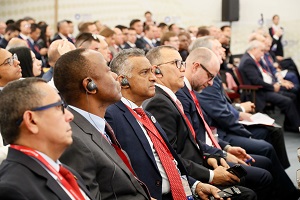 The thesis in Igor Sechin's report that the digital revolution opens a new era in the development of the oil and gas industry was warmly echoed by the audience. In particular, David Gadzhimirzaev, General Director of TOFS Oilfield Services Group, thanked Rosneft for supporting innovation and technology development. He emphasized the importance of ensuring the availability, stability and reliability of resources, which is exactly what new technologies can provide, which will reduce the cost of bringing barrels to the surface.
The thesis in Igor Sechin's report that the digital revolution opens a new era in the development of the oil and gas industry was warmly echoed by the audience. In particular, David Gadzhimirzaev, General Director of TOFS Oilfield Services Group, thanked Rosneft for supporting innovation and technology development. He emphasized the importance of ensuring the availability, stability and reliability of resources, which is exactly what new technologies can provide, which will reduce the cost of bringing barrels to the surface.
"We all know that just this year the Energy Strategy-2050 was approved, which includes the fact that by 2050 about 70% of the Russian Federation's production will be from hard-to-recover reserves. Therefore, we are not only working on expertise, but also working on the production of new technologies," Gadzhimirzaev said.
Department of Information and Advertising
Rosneft Oil Company
June 21, 2025

-315xx70.png)

